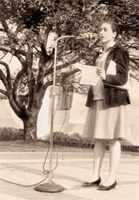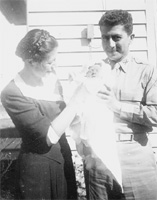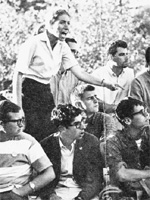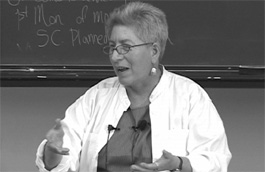home | metro santa cruz index | the arts | books | profile

The persistence of memory: Aptheker at a 1967 antiwar protest.
The Art of Memoir
A kind of literary therapy, the process of writing a memoir can bestow revelations upon authors as well as readers.
In this issue, Bettina Aptheker and Frank McCourt talk about the process of bringing their past to the printed page.
UCSC Feminist Studies Professor Aptheker has just published Intimate Politics: How I Grew Up Red, Fought for Free Speech, and Became a Feminist Rebel (Seal/Avalon, 545 pp., $16.95 paper), a compelling chronicle of an incredible life and the tumultuous legacy from which it sprang.
Aptheker was kind enough to provide us with an excerpt from her book as well as thoughtful answers to our questions about the art of "bearing witness."
Author McCourt, who became a household name after the publication of Angela's Ashes, talks about writing his most recent memoir, Teacher Man: A Memoir (Scribner, 272 pp., $26) from which he'll be reading at Capitola Book Cafe this coming Sunday, Nov. 19. His candid interview with Metro's Laura Mattingly begins here.
Breaking the Silence
In an excerpt from her new book, UCSC's Bettina Aptheker begins to confront her memories of childhood abuse
The poet Muriel Rukeyser once asked, "What would happen if one woman told the whole truth about her life?" And answered, "The world would split open." This question and her response troubled my sense of self and purpose for many years, and became a kind of koan for writing this memoir. The poet Adrienne Rich, moving along a similar path, wrote in the poem "Transcendental Etude": "The longer I live the more I mistrust / theatricality, the false glamour cast / by performance, the more I know its poverty beside / the truths we are salvaging from / the splitting-open of our lives." As I began thinking about writing a memoir, I was asked to contribute to the anthology Red Diapers: Growing Up in the Communist Left. I began writing, and what emerged first were these lines I had read years before in a lesbian anthology called Nice Jewish Girls: "Of the Jewish daughter it has been written: To inherit a father's dreams makes you the eldest son. To further his ambitions makes you heir to the throne."
My father, Herbert Aptheker, was both an historian of African American history and a well-known member of the U.S. Communist Party. He began publishing in the 1930s, in the Communist, under the pseudonym H. Beal. Later, in the 1950s, The New York Times would describe him as the Communist Party's "leading theoretician." As a child I stood in awe of him, of his intellectual prowess, physical stamina, his orations. My mother, Fay P. Aptheker, organized our family life; she also held steady employment, and her salary supported us for most of my childhood. She was my father's emotional bedrock--and his first cousin.
While reading an interview with the Israeli novelist David Grossman, I came upon a description of childhood that stunned me with its emotional accuracy. He said that childhood is a very lonely time, that it is "the most complicated and sometimes even tragic period in our lives. . . . It's difficult for a child to decode and adjust to the hidden intentions of adults. . . . You don't know that every little thing is not the end of the world, that things are going to change."
As I began writing, sifting through my childhood memories, they erupted in ways I would never have predicted. A story emerged. A fault line opened, and my world underwent a seismic shift. I continued writing in the hope that my story might be of use to any who have struggled to come into their own sense of being, their own sense of life purpose and meaning. I also wrote in the hope that others might know that healing is possible. From reactions to my story I realized that I had made a hard journey, but most of the time, when I was just living my life day to day, I didn't think about it being hard or not hard. I just lived it and did what I had to do, or what I thought I should do. My parents gave me a rich cultural heritage; I had extraordinary opportunities for scholarship and travel. Encouraging me from the very young age of six to carry placards and sign petitions at political rallies in the tumultuous period of the McCarthy hearings and Communist witch hunts, my parents taught me that it was possible--and necessary--to be part of a movement to effect change in the world. But these gifts came to me at a terrible cost.

Soiled legacy: A newborn Bettina poses with her famous Marxist scholar/activist parents Fay and Herbert Aptheker.
In winter there were often big snowstorms in Brooklyn. I'd wake up early in the morning, look out the window of our apartment, and see Washington Avenue and the botanical garden beyond, all white and pristine. Cars, buses and trucks would be at a standstill. Even the subway was delayed because miles of tracks lay aboveground. Orange trucks with huge plows cleared the streets. As it was plowed, the snow became muddied with the soot and grime of the city. The plows would bank the snow up against the curb. Some cars, which had been left on the street and were parked illegally, were ticketed by the police. The trucks plowed around the cars, burying them in the snow for a week or more. After the plowing, traffic resumed and the remaining snow was churned into blackened slush. Walking to school in my snowsuit and boots, a wool hat pulled down over my ears, I stomped through the snowbanks. The snow came up to my hips, even my waist, and it crunched under my boots. The crunching felt good; it sounded like bones cracking. Each step was harder to take, and my breath came in short spurts, the puffs of steam condensing into balls of mist. When I was about 10 years old I went to a ski resort in Vermont with friends of my parents. My parents did not ski and had not wanted to go. The friends showed me the rudiments of skiing. On the lift I swung my skis back and forth in the air. Then I skied down a long pass. The wind seared my cheeks, and my eyes teared. I felt exhilarated in the cold. The friends had forgotten to show me how to slow down and how to stop. I gathered speed, faster and faster. Then I lost a ski; I slid on my butt to a stop in a snowbank at the foot of a slope. I was laughing. A small crowd of onlookers laughed with me and cheered as I stood up, unhurt. Vermont in winter seemed to me a fairy tale, a never-never land. When it began to snow I went out from our hotel and stood in the forest. I stood very still like the trees. Snowflakes glistened on my jacket, forming small mounds on my shoulders. This was when I first noticed how quiet a forest is; the snow fell with only a whisper of sound. It blanketed everything. Cedar, evergreen and pine were ornamented in crystal, while maple, elm and oak stood at attention like whitened sentinels. In winter, the young saplings in mountain forests are completely covered, smothered in snow. Only the heartiest survive and make it to the spring thaw. I was the young sapling, in emotional hibernation, spaced out, waiting for a spring thaw I did not know would come.
A few months after I started writing the story of my life, I took my parents out for lunch. It was 1995. I was 50, Mom was 90 and Dad had just turned 80. By then they had been living in San Jose, Calif., for many years. I took them to The Fountain, the coffee shop at the Fairmont Hotel, because it was one of Mother's favorite places, the tables set with linen cloths. All through lunch my father sniped at me. I tuned out his mean-spirited jibes about my appearance, my work, my lack of productivity, my children, my political view, as quickly as he made them. The only reason I remember them now is because it was so bad that our waitress, with whom my father had been "joking" in a series of thinly disguised sexual innuendos, intervened.
My father had wanted to order dessert. The waitress said, "I'll bring you dessert if you stop being so nasty to your daughter!" I was startled from my reverie. I had been "gone" from the table, "checked out," as I so often was when in the company of my parents, this pattern of dissociation long in place as a way to deal with the untenable. I thought, Has he been nasty to me? With friends present, my father always extolled my virtues, praised me, seemed proud that I was a professor. And now, in private? His words came roaring back into sound. I had erased the memory of his conversations almost instantaneously, a habit of 50 years. I was so grateful to that waitress. This was how it was in my childhood; what was untenable was erased. As a result, I was almost completely without access to my emotions. As I write this I have had to go back into the experience, relive it as it was happening, have the re-memory of sexual violence, and recover the feelings as they finally erupt. But the eruption is now, not then, not in childhood. Then I was silent, and almost completely absent from myself.
Sometimes when I hear a piece of classical music, for example a Brahms concerto I particularly like, I feel a swell in my throat for the beauty of the music. And I feel so much for the child, the small child who escaped into the concertos and symphonies, who vanished from her seat and soared over audiences and orchestras, blissed out in the sounds of heaven, whose heart broke open in the weeping of the cello.
Copyright © Bettina F. Aptheker from 'Intimate Politics: How I Grew Up Red, Fought For Free Speech, and Became a Feminist Rebel.' Reprinted by permission of Seal Press, an imprint of Avalon Publishing Group, Inc.
Free Speech Moment
Bettina Aptheker on the healing power of memoir, her break with Marxism, and the maturing of UC-Santa Cruz
Interview by Bill Forman
METRO SANTA CRUZ: What inspired you to set about writing your memoir, and how did you find the process of writing about your own life affected you personally?
BETTINA APTHEKER: I often tell stories drawn from my life experiences in my classes, especially in Introduction to Feminisms. And students often encouraged me to write them down. Then colleagues and friends encouraged me too, and finally I was invited to write a short autobiographical piece for an anthology on "red diaper babies"--meaning kids who grew up in Communist families. This was published, and the feedback was very positive. I enjoyed doing it and I could see a way in which writing my story might be helpful to others, especially in describing both the political movements which I co-led, like the Free Speech Movement at Berkeley, and the personal issues that were affecting my life, e.g. child sexual abuse, rape, abortion and so on. I wanted to show how these personal issues were also political. The process of writing the memoir was extremely healing for me. It was painful also, and it took me more than eight years to finish it, writing mostly in the summers. Overall, however, it was a deeply healing and satisfying process.
At an earlier point, your book bore the title "Intimate Politics: Autobiography As Witness." Can you talk about the concept of being a witness and how it informs your work?

Speaking freely: Aptheker addresses a Free Speech Movement rally early in the 1964-65 school year.
Autobiographies are often thought of as confessional writing. I didn't feel that I was "confessing." I felt as though I was bearing witness to and a participant in a particular historical period beginning in the 1940s when I was born. I felt that I was a reliable witness to my own life, and that I could describe the things that happened to me and the things I saw and heard and came to understand in that way. Being a witness shifted the writing process for me. It gave me some distance from personal trauma in a way that made it possible for me to write about it. I was able to introduce the idea of a "politics of trauma," showing how sexual violence, for example, is part of a political system of social control. Bearing witness allowed the "me"--meaning the small me, the small part of my mind--to see myself in a larger perspective. The memoir comes out of my lived experience, but in a deeper sense it is not about me. It is about the times in which we, as girls and women, live.
Today's cultural theorists are more inclined to critique the "production of meaning" than the "means of production." How would you say your own evolution from Marxism to feminism positions you in terms of reconciling these approaches?
I find that Marxist ideas and the things I learned in the Communist Party often remain valid and helpful. For example, the Marxist understanding of who owns the means of production, of how exploitation happens, of the ways in which class structures the society, of how globalization and so-called "free trade" are part of a new imperial agenda, are all very much related to my understandings of the world and politics. Likewise, I have always been involved in struggles against racism, especially in the U.S., and this is also, of course, a worldwide struggle. I was, for example, deeply involved in the movement to free Angela Davis is the 1970s and this is described in the memoir. Today I continue to be involved in struggles for economic justice, affirmative action, struggles against police violence and racial profiling, for example. But I found that Marxism and the Old Left, in general, were very limited in their understandings of the depth and complexity of women's liberation. So, I put feminist ideas at the center of my thinking, and tried to contribute to a new way of thinking about race, class, gender and sexuality and how they are all interconnected, all part of a system of domination, that for me also includes the environment, the earth and all her creatures. And yes, I think today's cultural theorists have made vital contributions to our understanding of how the media, advertising, film and so on influence and shape the ways in which we think and act in the world. In my classes, for example, the students and I consider how to critically analyze what we see and the messages that are being given to us. For example, we consider how women's bodies are so often sexualized; how we are reduced to sexual objects for male gratification and how this makes us feel. In addition, a spiritual practice has also been significant in my evolution as a human being, and I have found Buddhist meditation to be extremely helpful in training and calming my mind, and in cultivating compassion. I have combined elements of Marxism, and feminism, cultural theory and spirituality.

Rules for radicals: Still commanding long waiting lists after 25 years, Aptheker's Intro to Feminism is among UCSC's most popular classes.
What changes have you seen in UCSC's role within the community?
When I came to UCSC in 1979 there were about 5,000 students. The forest was everywhere. We were like a small village and the staff, for example, personally knew many of the students. Classes were small; the emphasis was on teaching and on undergraduate education. But within the general California state plan for higher education, UCSC was always expected to grow, and over the years that plan has been implemented. With the population growth in the state, and the demand for public education, waves of new students are expecting to attend the UCs. The drive to expand UCSC has come, primarily, from the state legislature, and the requirements of cities to provide resources for the UCs is written into the California Master Plan for Higher Education. It is important for people in our community to recognize this. UCLA and Berkeley have been maxed out in terms of student enrollments for decades. The pressure is on the smaller campuses like Riverside and Santa Cruz to continually expand and for the building of the new campus at Merced. I loved UCSC the way it was for the first years I taught here; I loved the sense of community; I loved the emphasis on undergraduate teaching. This has changed. I still love my students, and enjoy teaching. But UCSC has become much more like other large public universities. In addition, I think it is outrageous that students (and their parents) are required to pay higher and higher fees while the quality of services is diminished because of cutbacks in staff positions. I also feel that staff salaries at UCSC are so below the standards of what should be paid as to be indefensible.
And more generally, how do you see the role of universities in society at large?
The role of the university, in general, is to train the next generation of scientists, engineers, middle management and upper management personnel, and to insofar as possible, instill in the new generation a continuation of the dominant system of economic, racial and gender privilege. Because I teach in a Feminist Studies department we have a different, more radical agenda. Many of my colleagues do as well, not only at Santa Cruz but in other UCs and across the country. We want our students to think critically and for themselves, and I think many of us hope to encourage their idealism, and their deep aspirations for social justice and peace.
Send a letter to the editor about this story.
|
|
|
|
|
|